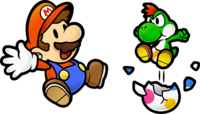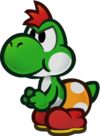Yoshi Kid: Difference between revisions
No edit summary |
m (Text replacement - "(\[\[Category:[^\]\|\n]+) Series Party Members(\]|\|)" to "$1 series party members$2") |
||
| Line 203: | Line 203: | ||
[[Category:Playable Characters]] | [[Category:Playable Characters]] | ||
[[Category:Babies]] | [[Category:Babies]] | ||
[[Category:Paper Mario | [[Category:Paper Mario series party members]] | ||
[[Category:Paper Mario: The Thousand-Year Door Characters]] | [[Category:Paper Mario: The Thousand-Year Door Characters]] | ||
[[Category:Super Smash Bros. Brawl Stickers]] | [[Category:Super Smash Bros. Brawl Stickers]] | ||
Revision as of 06:06, August 31, 2021
- This article is about Mario's Yoshi partner from Paper Mario: The Thousand-Year Door. For the character Yoshi from other games, see Yoshi.
- Not to be confused with Mini Yoshi.
Template:Character-infobox Template:Quote2
Mini-Yoshi (known originally as Yoshi, sometimes called Yoshi Kid[citation needed]) is Mario's fourth party member in Paper Mario: The Thousand-Year Door. He is a spunky Yoshi baby and the youngest of Mario's party members (being newborn). His purpose in the overworld is to allow Mario to ride him and move him around much faster and use a Flutter Jump-like ability to cross gaps.
History
Paper Mario series
Paper Mario: The Thousand-Year Door
While Mario, Goombella, Koops and Flurrie are fighting in Glitzville's Glitz Pit, they find that one of the fighting teams, the Armored Harriers, appears to be impervious to any attack they use. At an earlier time, Mario had found a Yoshi's Egg bouncing around, being chased by the owner of the Hot Dog Stand, Mr. Hoggle (who had hopes of making a Southern Fried Egg Dog of Tastiness with it). Mario eventually caught it, and Mr. Hoggle allowed him to keep it as most people "don't like eating stuff that jumps all over the place". After Mario returns from his problematic battle with the Armored Harriers, the egg hatches into a newborn Yoshi baby who thanks Mario for saving his life. He then joins Mario (who he knows as Gonzales), who proceeds to name him. The Yoshi can defeat the Armored Harriers by eating them and spitting them at each other, as the gulp attack ignores enemy defense. He travels with Mario for the rest of the game.
At the end of the adventure, he goes solo at the Glitz Pit, going under the name "The Great Gonzales Jr.", and is stated to be getting close to the title match. In Goombella's letter, the Yoshi challenges the "Great Gonzales" by saying "I could totally take you in the ring now, so bring it!" He is notable for calling Mario "Gonzales" throughout the entire course of Paper Mario: The Thousand-Year Door (in a manner similar to other non-player characters such as Goldbob and his family); his odd familiarity with this name is due to Mario's pseudonym, "Great Gonzales" (upon Grubba and Jolene's insistence) while fighting in the Glitz Pit. By the end of the game, though, the Yoshi would appear to have slowly realized that "Gonzales's" real name was Mario, but he states that Mario will always be Gonzales to him.
Tattle
Goombella can use Tattle on the Yoshi Egg only after Mario glides down to the roof of the Hot Dog Stand where the egg sits but before Mario interacts with the egg.
- “Gosh, what a colorful egg! Must be a good one, huh? I mean, look at it jump! But jeepers creepers, I sure wouldn't want to try to eat it... I mean, EWWWWWW! I don't eat moving things. Let's hurry up, grab it, and give it back to Mr. Hoggle.”
- —Goombella, Paper Mario: The Thousand-Year Door
Super Paper Mario
In Super Paper Mario, Yoshi appears as a Catch Card won by winning the Duel of 100 in the Sammer's Kingdom. Francis has a collection of seven Yoshi dolls, each one a different color. Lastly, Yoshi, along with all the other partners from the previous Paper Mario titles appear in a photograph at the Mario Bros.' House during the introduction.
Super Smash Bros. series
Super Smash Bros. Brawl
In Super Smash Bros. Brawl, Mini-Yoshi appears as a Sticker.
Super Smash Bros. for Wii U
In Super Smash Bros. for Wii U, Mini-Yoshi reappears as a trophy. This is the first game where he is referred to with this name.
Coloration/Description
Yoshi's coloration is determined by the amount of time that passes between the point where his egg joins Mario's party atop the Hot Dog Stand to when Mario eventually meets the newborn after fleeing from or losing to the Armored Harriers. Initially, Yoshi is green, has a red mohawk, and wears orange pants with white polka dots (giving it a Yoshi's Egg-like pattern) and a pair of his species' signature boots. While in his egg, however, Yoshi's color scheme changes every few minutes, as shown in the chart below. If more than twenty minutes elapse before Yoshi hatches, the cycle restarts. Each coloration is for aesthetic purposes only, and will stay the same for the rest of the game upon Yoshi's hatching.
| Time | Color |
|---|---|
| 0-6 Minutes |  Green |
| 6-9 Minutes |  Red |
| 9-12 Minutes |  Blue |
| 12-15 Minutes |  Orange |
| 15-18 Minutes |  Hotpink |
| 18-19 Minutes |  Black |
| 19-20 Minutes |  Gray |
Attacks and stats
| Attack | Flower Points Needed | Effect | To Attack | Yoshi's Hit Points | Attack Power | Move Ranks |
|---|---|---|---|---|---|---|
| Ground Pound | 0 | Bounces on a single enemy. | Repeatedly press |
Level 1: 10 Level 2: 20 Level 3: 30 |
This attack does 1 damage.
|
Initial |
| Gulp | 4 | Swallows an enemy and spits it at another enemy. | Press and hold |
Level 1: 10 Level 2: 20 Level 3: 30 |
Level 1: 4 Level 2: 5 Level 3: 6 |
Initial |
| Mini-Egg | 3 | Throws eggs at all the enemies, and if successful, shrinks the enemies. | Press |
Level 2: 20 Level 3: 30 |
The Attack does 1 damage.
|
Super Rank |
| Stampede | 6 | Summons a Yoshi herd to attack all enemies. | Repeatedly press |
Level 3: 30 |
|
Ultra Rank |
Profiles
In game bio
"This newborn Yoshi baby may be small, but he's got quite an attitude. Press X to hop on his back and move more quickly. Press A when riding to float through the air."
Catch Card
- Card Type: Rare
- Card Description: It's Yoshi from the last Paper Mario adventure. This scrappy Yoshi was the only way to travel!
- How to Obtain the Card: The Duel of 100 in Sammer's Kingdom needs to be completed in order to obtain all Paper Mario: The Thousand-Year Door partner cards from King Sammer.
Super Smash Bros. series
Super Smash Bros. Brawl sticker
| Image | Game | Effect |
|---|---|---|

|
Paper Mario: The Thousand-Year Door | [Throwing] - Attack +5 Usable by: Mario, Luigi, Yoshi, Peach, Bowser |
Super Smash Bros. for Wii U trophy
Names in other languages
Yoshi / Mini-Yoshi
Note that the player can, as in the English version, name this character anything under a certain space limitation. These names are the default if the field is left blank.
| Language | Name | Meaning | Notes |
|---|---|---|---|
| Japanese | チビヨッシー[?] Chibi Yosshī |
Chibi Yoshi; same as Baby Yoshi from Super Mario World. | |
| German | Mini-Yoshi[?] | - | |
| Italian | Miniyoshi[?] | ? | |
| Russian | Мини-Йоши (Super Smash Bros. for Wii U)[?] Mini-Yoshi |
Mini-Yoshi | |
| Spanish | Yoshito[?] | "-ito" is a Spanish diminutive suffix. When attached to a name, it denotes affection. |
The Great Gonzales Jr.
| Language | Name | Meaning | Notes |
|---|---|---|---|
| Japanese | グレート・ゴンザレス・ジュニア[?] Gurēto Gonzaresu Junia |
Great Gonzales Jr. |
Trivia
- As stated above, Yoshi's Glitz Pit origins resulted in him calling Mario by the name "Gonzales" throughout the whole course of Paper Mario: The Thousand-Year Door, except for six times. Although the use of "Mario" in the ending was deliberate and even played somewhat of a role in Yoshi's character development, the other listings were likely a mistake on the developers' part. These are the following times Yoshi calls Mario by his actual name:
- At the ending of the game
- In Grubba's office when reading his secret paper about the machine under the ring
- At Twilight Town when the steeple bell rings, changing Mayor Dour into a pig
- At Keelhaul Key after Frankie says "I love you" 100 times
- At the very end of Chapter 5 when the Piantas say they're staying on Keelhaul Key
- If Mario brings him along to the top of Riddle Tower for the first time.
- Yoshi is one of two Yoshis that can be seen outside battle in Paper Mario: The Thousand-Year Door; the other one is seen on the Excess Express, as an adult.
- During the 2nd fight with Doopliss, after defeating Goombella, Koops, and Flurrie, Yoshi will appear, but, no matter what his nickname is, his enemy name is always "Yoshi".
- The Italian version of Paper Mario: The Thousand-Year Door refers to him specifically as a Miniyoshi[1], further explaining that Miniyoshis are "Yoshis just hatched from the eggs"[2]. This aligns with the character's Japanese name, which is identical to a Baby Yoshi, along with other localizations and in-game text in the English version referring to him as a "newborn Yoshi baby". The name "Mini-Yoshi" (which is incidentally too large to fit in the original game's text space) was given for his trophy in Super Smash Bros. for Wii U.
- Additionally, the Player's Guide for the game first refers to the character as "a Mini-Yoshi."
References
| Yoshis |
|---|
| Yoshi characters |
| Baby Fat • Boshi • Fearsome 5 • "It" • Mini Yoshi • Rabbid Yoshi • Ura Yoshi • Village Leader • Yokkī • Yoob • Yoshi • Yoshi Kid |
| Yoshi types |
| Baby Yoshi • Balloon Baby Yoshi • Bubble Baby Yoshi • Glowing Baby Yoshi • Star Yoshi • Winged Yoshi • Yoshi |
| Yoshi relatives |
| Bahamutt • Dorrie • Noshi • Plessie • Rex |
| Yoshi egg types |
| Egg (Mario & Luigi: Partners in Time) • Flashing Egg • Giant Egg • Mega Eggdozer • Metal Eggdozer • Yoshi's Egg |
| Yoshi-inspired vehicles |
| Coconut 1 • Dreamy Egg • Egg 1 • Egg Rider • Go-Go Yoshi • Gold Egg • Turbo Yoshi (Black, Blue, Red, White) • Yoshi Bike |



